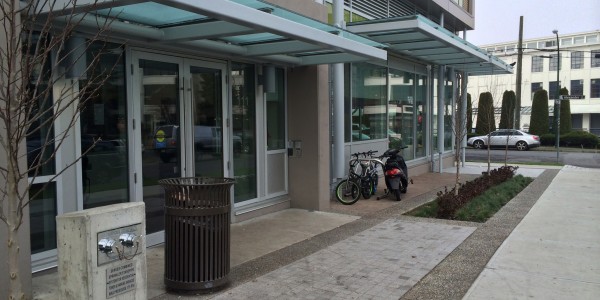The opening of Alexander Street Community
In early November 2014, members of the Railtown Business Community met with partners of the not yet-opened Alexander Street Community, including BC Housing, PHS Community Services Society and VCH, asking how they can welcome the new members to their community. Working in an upcoming and trendy neighbourhood, everyone was not initially welcoming of the idea of social housing entering the neighbourhood when it was announced in 2009. However, attitudes have changed and the business community has been very supportive of the new project, attending community meetings and providing welcome packages for the residents.
Many amenities
Shortly after that meeting, the Alexander Street Community, at the corner of Princess Avenue and Alexander Street, opened its doors and began moving in the 139 people who reside there. The building has 100 units of permanent housing and 39 units of temporary housing for individuals with chronic and severe mental health and addiction challenges, known as the Transitional Program where VCH provides clinical oversight. In each self-contained suite, residents have the privacy of their own bathroom and kitchenette, a luxury for many who were previously living on the street. Residents have on-site access to a medication administration program, home support and a hot dinner daily. Programs and activities are offered on-site, including acupuncture, journaling, recreational programs and exercise groups, and will expand over the next while to include addiction and mental health, life skills and employment skills. With many welcoming common areas throughout the building, spaces for games and movies, and 2 garden patios, the building truly invites socialization and community building.
Medical and psychiatric care
People who are a part of the Transitional Program have access to an on-site, VCH-led clinic providing medical and psychiatric care, nursing services, and case management. Much of the programming in the building is led by the transitional program staff. The length of stay is about 9 to 12+ months and the transitional program team works to support the resident’s transition to less supported, permanent housing. The program is evidence-based, resident-centred, trauma-informed, and focuses on stabilization and transition.
With multiple organizations collaborating in the operations of this project, a physical space and programming that supports relationship building, and an urban community that has come together to support a very vulnerable population, community is an integral piece to the ASC.
Related links
Hello, neighbour! How a B.C. design firm welcomed social-housing tenants – Globe and Mail

